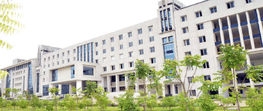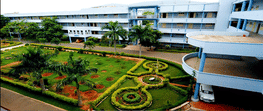Dr. Nalini Bikkina is the Director of the GITAM School of Humanities and Social Sciences. She has a Ph.D. in Psychology from Andhra University and was an ICSSR Doctoral Fellow. Nalini was a former Group I officer of the Andhra Pradesh Public Service Commission. With her work experience in industry, research, and administration, she carries an interdisciplinary interest spanning across psychology and public systems. Being NET-qualified, she had worked on research projects funded by the UGC, ICPR, and the Indian Institute of Management, Ahmedabad. She is a Fulbright Fellow at the University of Nebraska at Omaha, a College of Arts and Letters Visiting Fellow at James Madison University, Virginia, and a Fellow of the Royal Society of Arts, London. She had won the Fulbright Alumni Award.

How do you balance the needs of faculty, students, and administration as director of the School of Humanities & Social Sciences?
I try to create this balance by choosing wisely—at the level of student intake and faculty recruitment. Faculty are hired as per their capabilities and interests. I generally do not encourage mediocrity in faculty intake and work hard to retain faculty with good credentials. This effort aligns the faculty with the vision of the School and the University. Also, admissions are offered after due diligence considering the scores on the written test and performance in the personal interview rounds. Personal interviews are undertaken by the faculty with expertise in the corresponding areas. We pick students as per the aptitude and interest relevant to their programs of choice. Our focus is majorly on the quality of admissions rather than on the quantity of admissions. Once these two fronts are taken care of, a balance can be struck between the needs of the faculty and the students. GITAM administration requires that the School of Humanities and Social Sciences provide support services to all other constituent Schools of the University through elective and minor offerings. With quality faculty who consequently deliver quality teaching, our courses, and minor programs are becoming increasingly popular.
What do you feel is the USP or what are the differentiating factors that make GITAM stand out from other institutions?
The strongest USP for GITAM is that it is a multi-faculty Institution. The fact that several faculties, ranging from Medicine to Humanities and Social sciences, coexist opens horizons in terms of interdisciplinary and transdisciplinary teaching and learning experiences and research collaboration. For instance, our Psychology programs garner strength from the existence of our teaching hospital, which offers fertile ground for experiential learning. Therefore, we can confidently curate and administer robust clinical psychology, rehabilitation psychology, and health psychology specializations with hospital attachments. The co-existence of multiple faculties also provides rich contexts for interdisciplinary and transdisciplinary research. For instance, we completed a major research project from an AYUSH grant in collaboration with GIMSR wherein we studied Yoga as an intervention for Diabetes using several biochemical markers. Learning and experience from interdisciplinary and transdisciplinary research further strengthen our teaching, as findings from such research enrich our curriculum and the teaching-learning experience that we provide.
How do you stay current with the latest trends and developments in your field and incorporate them into the curriculum and programs offered by the school?
Continuous interaction with the field agencies—government, NGOs, Civil Society Organizations, and corporations—provides a feedback loop that facilitates a consistent review of our curriculum and pedagogy to change with changing times and perhaps stay ahead of time. Additionally, we empanel experts from the field as members of our Boards of Study, which is the body that reviews curriculum on an as-needed basis. Expert lectures also help us visualize and pre-empt forthcoming changes required in curriculum and pedagogy, and we act accordingly and in a timely fashion. Also, GITAM is well equipped with scientific resources, including journals and MOOCs, which help us stay abreast of trends in our respective areas and plough this understanding back into curating and delivering our programs in a contemporary manner.
Check GITAM Visakhapatnam Courses & Fees
How well is GITAM focusing on maintaining industry relationships with companies in order to leverage them for live projects, training, and placements for the students?
GITAM has entities whose exclusive brief is to stay in constant touch with all its stakeholders, including alumni. The GITAM Career Guidance Center, along with all its verticals like Other Career Options and External Relations, liaises between the University and the field, creating continuous interaction and feedback loops, and opening horizons for our students, including opportunities to be accepted into prestigious fellowships like the Teach for India and Gandhi Fellowships. Another vertical of GCGC called Competence Development maps skill requirements against a plethora of job descriptions and achieves matches between several roles in the market and the capabilities of the students, thereby placing diverse employment opportunities on the table. Project and placement opportunities are frequently broadcasted through all our communication channels, creating awareness about these opportunities and encouraging students with interest and the requisite qualifications to apply for and bag these roles.
What is something a Social Science aspirant can expect from joining GITAM?
Society is the laboratory for a Social Scientist. The School of Humanities constantly endeavors to connect the field to the classroom and provide consistent opportunities for students to learn from the field and emerge as well-equipped and confident social scientists. In the current employment scenario, there are several opportunities for aspiring social scientists across corporate, government, multilateral, and civil society organizations. GITAM’s GCGC provides access to these opportunities, including guidance for Civil service-related competitive examinations. Additionally, the major and minor systems prevalent with open electives open a vista of opportunities for students to pursue higher education, including opportunities to study abroad. Our students acquire the capability of competing for acceptance by the best institutions in the country and even a handful of Ivy League institutions abroad. For instance, one of our students from our very first cohort of the BA program was accepted at the London School of Economics. We have several other students from our previous cohorts being accepted at IITs at Hyderabad and Mandi and reputed institutions abroad like the University of Turku in Finland with full fellowship for a Master’s program and at IITs Roorkee and Guwahati, IIM Ranchi, and NIMHANS for Doctoral Programs with full fellowship. One of our Master’s students has been accepted by the National University of Ireland at Galway for a Doctoral Program with a full fellowship. We have a strong alumni network which is of immense help to the current batch of students.
What are the biggest challenges currently faced by your School in the respective course domain, and how do you plan to address them as the director?
Faculty retention is one of the challenges that I envision. While GITAM pays on par with other entities in this space, there are likely to be locational disadvantages with recruits choosing bigger cities over Tier II cities. I will continue to persist and strive to recruit and retain talented faculty colleagues by creating an apt research and teaching atmosphere and by curating and sustaining a collegial environment in the School.
Can you describe what significant support GITAM provides for Research and innovation?
GITAM provides a single window for project announcements and clearance for project proposals. This brings a lot of research opportunities to our faculty colleagues' doorsteps and eases out bureaucratic hassles. GITAM also creates a conducive space for inter-university and external collaborations in research. Seed grants encourage our young faculty to take up pilot projects, which they can scale up subsequently. GITAM integrates research accomplishments into our performance review system, which encourages faculty colleagues to constantly endeavour to conduct relevant research in their areas of expertise. An emphasis on the quality of intake into our doctoral programs further creates a good research ambiance and facilitates the scholarly exchange of ideas.
Click GITAM Visakhapatnam Placements
How would you promote experiential learning and practical application of knowledge within the School?
Experiential learning has been one of our strengths right from the start. We integrate experiential learning into our curriculum through full-credit field courses like Service Learning and Practice School. Students in our Undergraduate and Master’s programs are encouraged to engage with the field through these mandatory courses. Additionally, these courses have a formative evaluation component based on field exposure, experiential learning, or laboratory work. There is a significant emphasis on community engagement in most of the individual courses that comprise our programs. Additionally, focusing on venture development has yielded results in the past. For instance, three students from one of our Master’s cohorts developed and scaled up a mobile application to support caregivers of patients with dementia. This enterprise is now a full-fledged start-up. This was accomplished through a persistent focus on experiential and practical learning to supplement in-class learning.
What is your vision as a director for the future growth and excellence of the School?
My vision is to place the School of Humanities on an equal pedestal with some of the best schools in the country in this domain, including Ashoka, Krea, Azim Premji, and Shiv Nadar. To me, our strength lies in quality and not so much in numbers. I believe there are no shortcuts to excellence, and there should be no compromise on quality.


.png?h=132&w=263&mode=stretch)





.png?h=78&w=78&mode=stretch)


![Indian Institute of Petroleum and Energy - [IIPE]](https://image-static.collegedunia.com/public/college_data/images/appImage/16002398760336.jpg?h=111.44&w=263&mode=stretch)





![Anil Neerukonda Institute of Technology & Sciences - [ANITS]](https://image-static.collegedunia.com/public/college_data/images/appImage/1591266477Cover.jpg?h=111.44&w=263&mode=stretch)

![Vignan's Institute of Information Technology - [VIIT]](https://image-static.collegedunia.com/public/college_data/images/appImage/19177_5.jpg?h=111.44&w=263&mode=stretch)

![Andhra University College of Engineering for Women - [AUCEW]](https://image-static.collegedunia.com/public/college_data/images/appImage/28410_ANUCEW_APP.jpg?h=111.44&w=263&mode=stretch)













![GITAM School of Architecture - [GSA]](https://image-static.collegedunia.com/public/college_data/images/logos/1741581880GITAMLOGO.png?h=72&w=72&mode=stretch)
![GITAM Dental College & Hospital -[GDCH]](https://image-static.collegedunia.com/public/college_data/images/logos/1764687221Screenshot20251202at8.22.59PM.png?h=72&w=72&mode=stretch)







![Gitam Institute of Medical Science & Research - [GIMSR]](https://image-static.collegedunia.com/public/college_data/images/logos/1732968602gimsrlogo.jpg?h=72&w=72&mode=stretch)
.png?h=72&w=72&mode=stretch)







.jpeg?h=72&w=72&mode=stretch)
.png?h=72&w=72&mode=stretch)
.png?h=72&w=72&mode=stretch)
.png?h=72&w=72&mode=stretch)






![Andhra University, College of Engineering - [AUCE]](https://image-static.collegedunia.com/public/college_data/images/logos/1756446694Header.png?h=72&w=72&mode=stretch)
![Vignan's Institute of Information Technology - [VIIT]](https://image-static.collegedunia.com/public/college_data/images/logos/148007135655.jpg?h=72&w=72&mode=stretch)
![Mohan Babu University - [MBU]](https://image-static.collegedunia.com/public/college_data/images/logos/1650533803logo200.png?h=72&w=72&mode=stretch)
![Barak Valley Engineering College - [BVEC]](https://image-static.collegedunia.com/public/college_data/images/logos/1584767969LogoofBarakValleyEngineeringCollege.jpg?h=72&w=72&mode=stretch)
![Anil Neerukonda Institute of Technology & Sciences - [ANITS]](https://image-static.collegedunia.com/public/college_data/images/logos/1591266477Logo.jpg?h=72&w=72&mode=stretch)
![Tezpur University - [TU]](https://image-static.collegedunia.com/public/college_data/images/logos/uv25401.jpg?h=72&w=72&mode=stretch)
![Centurion University of Technology and Management - [CUTM]](https://image-static.collegedunia.com/public/college_data/images/logos/16190002297038315326908908642635764348829995527831552n.jpg?h=72&w=72&mode=stretch)

![GMR Institute of Technology - [GMRIT]](https://image-static.collegedunia.com/public/college_data/images/logos/1479966276logo.png?h=72&w=72&mode=stretch)
![VIT University - [VIT- AP]](https://image-static.collegedunia.com/public/college_data/images/logos/1615969516Screenshot20210317134244.png?h=72&w=72&mode=stretch)
![Raghu Engineering College - [REC]](https://image-static.collegedunia.com/public/college_data/images/logos/1480399520newnew logo.jpg?h=72&w=72&mode=stretch)
![Andhra University - [AU]](https://image-static.collegedunia.com/public/college_data/images/logos/1394863829Andhra University (AU).png?h=72&w=72&mode=stretch)
![Sagi Ramakrishnam Raju Engineering College - [SRKR ]](https://image-static.collegedunia.com/public/college_data/images/logos/1697801139logo1.png?h=72&w=72&mode=stretch)

Comments